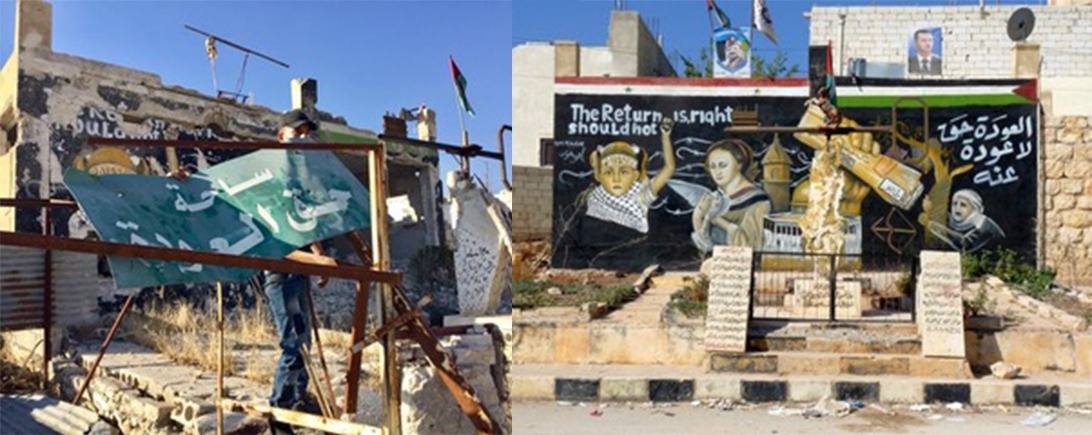1. The global Covid-19 crisis that started in early 2020 has once again underscored the fragility of the life of Palestinians in exile, especially of those in the Middle East. With the growing economic, social and political impact of the pandemic being felt, the tension in and around Palestinian refugee camps has been on the rise. Largely under the radar so far, protests and incidents in camps have become more frequent. Clearly, the Covid-19 crisis has exacerbated the fatigue and frustration of camp residents. Unfortunately, and typically, the most vulnerable and disenfranchised among the refugees, camp youth among them, pay the brunt of a broader crisis and risk to be exploited. ARDD urges vigilance and additional support for the refugees in these critical times and calls for the protection of the Palestinian camps as sacrosanct places of refuge and resilience.
2. In our beautiful and tormented region, Palestinian camps continue to touch a sensitive nerve, a testimony of a wound as yet unhealed, their very existence representing the dispossession and injustice meted to Palestinians for 73 years now, since the Nakba. Episodes of instability and crisis have always resonated strongly in the camps, with repercussions on the lives of the millions living in them, from the Gaza Strip and the West Bank, including East Jerusalem, to Jordan, Lebanon, Syria, and beyond. Too often, rather than being a safe haven, Palestinian camps have been subjected to turmoil or affected by conflicts in the region. The 1967 war, the conflict in Jordan in the late 1960s-early 1970s, the civil war in Lebanon (1975-1990) the first and second intifadas in occupied Palestine, the blockade and three wars in the Gaza Strip, and the conflict in Syria have all disproportionally affected the Palestinian camp inhabitants. In a number of instances, entire camps or large parts of them were erased overnight, at times in response to armed elements seeking shelter amongst refugee civilians. The price paid by innocent Palestinians was often beyond comprehension, adding salt to the unhealed wound of exile. A similar fate befell Palestinian communities further afield, in Kuwait, Libya, Iraq.
3. This painful reality forces us to remember that contrary to widespread public perception, the camps are not the “hotbeds of resistance” they are generally portrayed as, but first and foremost places where Palestinian life in exile has been rebuilt, the place where they live hoping to obtain the right to return, spaces of love and life, and, collectively, an important part of the social fabric of the Palestinian nation across the fragmentation of exile. It is therefore of the utmost importance that the camps be protected, so that they may continue to serve as centers of life for many Palestinians, especially children, and youth, till the day a just and durable solution for the future of the refugees is found. This entails maintaining social cohesion and preventing the exploitation of the refugees and their cause, often used as pawns in conflicts of others elsewhere. It should be clear that protecting the camps, safeguarding and upgrading the living conditions, and defending the rights of refugees in the various host countries does not mean renouncing the right of return or abandoning the Palestinian cause. For Palestinian refugees, the right to return, restitution and compensation flows from the historic injustice accompanying the birth of the refugee issue and has only become stronger with the passing of time and the further entrenchment of international law.
4. Protecting the camps, furthermore, requires generous and stable support for UNRWA, which was created to provide essential services to the Palestinian refugees, first and foremost to those residing in camps, and which has been given an ever-growing mandate vis-a-vis the refugees, having remained, since the 1960s, the main UN entity dealing with them in the region. ARDD is gravely concerned about the ongoing financial crisis faced by UNRWA, seriously compounded by the impact of Covid-19, and calls on donors to step up their support on a multi-year basis and with a long-term vision. In this respect, ARDD sees the upcoming UNRWA conference as an opportunity for a critical reexamination of the way the Palestinian refugee question has been tackled, and how the agency has interpreted and implemented its mandate over the past seven decades.
5. ARDD calls on the refugees, Palestinian youth, in particular, to aim their dreams and channel their energy toward developing their own communities hand in hand with the host communities. These youths have already demonstrated, in many instances, their maturity in resisting and denouncing any calls for extremism and violence, and ARDD encourages them to continue doing so by using civil society channels to advance the much-needed dialogue with host government authorities. Under the auspices of its Global Network on the Question of Palestine, ARDD is committed to work with and support Palestinian youth, disseminating knowledge concerning refugee rights, enhance their representation, and build their capacity for advocacy and action. ARDD calls on these youths to be the force of change and hope for a better future that our region and its people so greatly need and wholeheartedly deserve.


